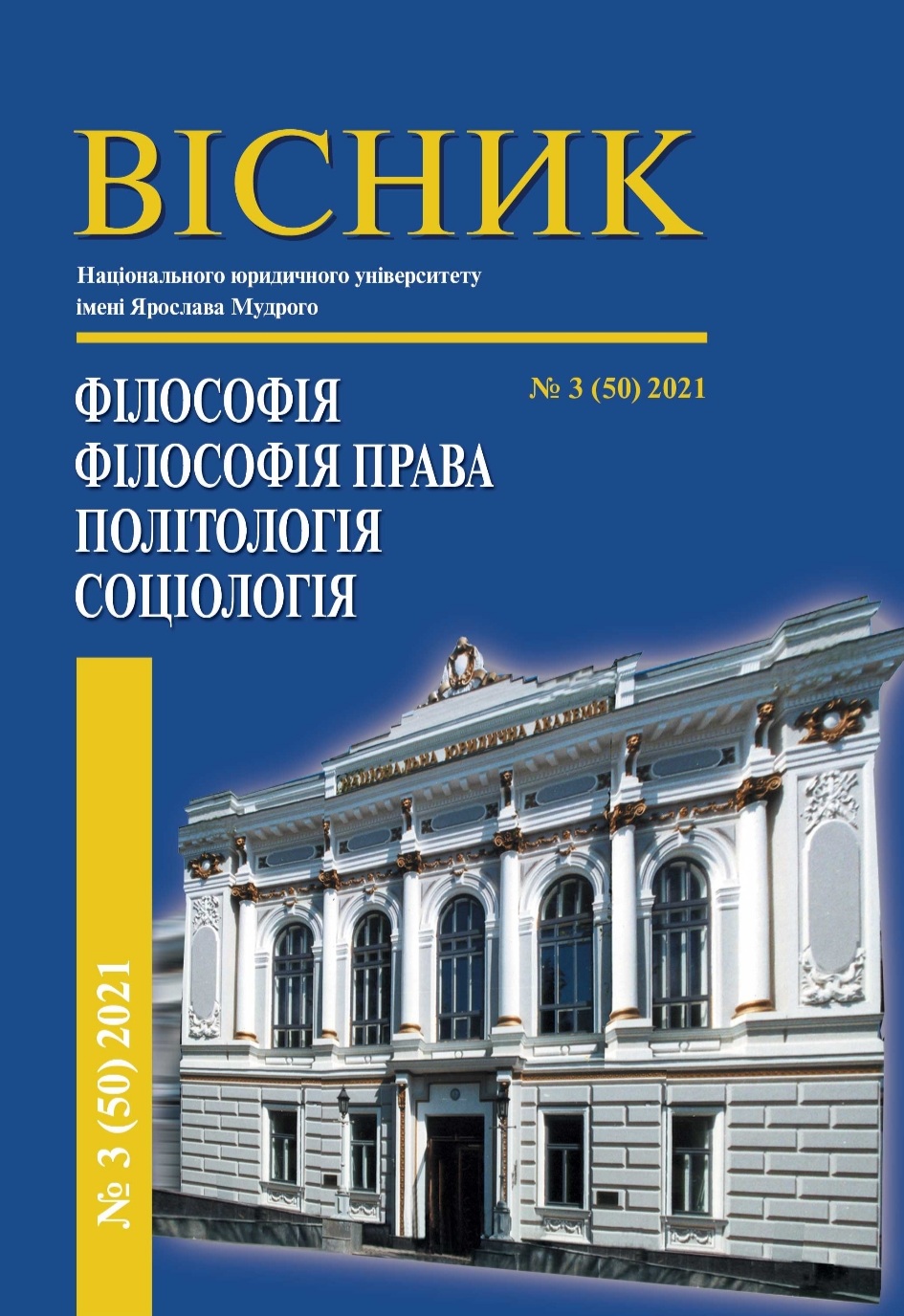ПРИКЛАДНЕ КОНСТРУЮВАННЯ КОНЦЕПТІВ У ПОЛІТИЧНІЙ НАУЦІ ЗА МЕЖАМИ СЕМАНТИЧНОГО ПІДХОДУ
DOI:
https://doi.org/10.21564/2075-7190.45.200942Ключові слова:
концептосфера політичної науки, концептологія, міждисциплінарні лінгвістично-політологічні дослідження, політична теорія, методологія наукових дослідженьАнотація
Методологічні дискусії щодо конструювання концептів політичної науки для прикладного кількісного та якісного емпіричного аналізу, що виходять за межі традиційного семантичного підходу до концептів як до термінів чи теоретичних конструктів, розглядаються у порівняльній перспективі но основі деконструкції причинно-наслідкового, онтологічного та реалістського бачення концептів, запропонованого американським дослідником Ґ. Ґертцем.Посилання
Greene, C. (2019). Nomadic Concepts, Variable Choice, and the Social Sciences. Philosophy of the Social Sciences, 50(1), 3-22.
Hay, C. (2002). Political Analysis: A Critical Introduction. Basingstoke: Palgrave Macmillan.
Robison J., Stevenson R. T., Druckman J. N., Jackman S., Katz J. N., Vavreck L. (2018). An Audit of Political Behavior Research. SAGE Open, 8(3). Retrieved from https:// journals.sagepub.com/doi/pdf/10.n77/2158244018794769
Gallie, W. B. (1956). Essentially Contested Concepts. Proceedings of the Aristotelian Society, 56, 167-198.
Goertz, G. (2006). Social Science Concetps. A User’s Guide. Princeton: Princeton University Press.
Stengers, I. (Ed.) (1987). D’une science a l’autre : des concepts nomades / D. Andler ... [et al.]. Paris : Seuil.
Berenskoetter, F. (2016). Approaches to Concept Analysis. Millennium: Journal of International Studies, 45(2), 151-173.
Sartori, G. (1970). Concept Misformation in Comparative Politics. American Political Science Review, LXIV(4), 1033-1053.
Gerring, J. (2012). Social science methodology: a unifiedframework. 2nd ed. Cambridge ; New York: Cambridge University Press.
Collier, D. & Mahon, J. E. (1993). Conceptual ’Stretching’ Revisited: Adapting Categories in Comparative Analysis. American Political Science Review, 87(4). 845-855.
Richter, M. (1995). The history of political and social concepts: a critical introduction. New York: Oxford University Press.
Fitzi, G. (2019). Max Weber’s concept of ’modern politics’. Journal of Classical Sociology, 19(4), 361-376.
Palecek, M. (2019). The evolution of ’culture’: Juggling a concept. Anthropological Theory, 20(1), 53-76.
Orsi, R. (2019). On the relevance of Carl Schmitt’s concept of Großraum in contemporary international politics. Journal of International Political Theory. Retrieved from https://doi.org/10.1177/1755088219874431
Gundersen, S. (2018). Mechanism-based Explanations versus Autonomy in the Social Sciences. Sociological Bulletin, 67(1), 35-50.
Barrientos Del Monte, F. (2017). From Sociological Interpretation to Political Science. Latin American Perspectives, 45(2), 51-61.
Kovacic, Z. (2018). Conceptualizing Numbers at the Science - Policy Interface. Science, Technology, & Human Values, 43(6), 1039-1065.
Diaz-Peralta, M. (2018). Metaphor and ideology: Conceptual structure and conceptual content in Spanish political discourse. Discourse & Communication, 12(2), 128-148.
Behr, H. (2019). Towards a political concept of reversibility in international relations: Bridging political philosophy and policy studies. European Journal of International Relations, 25(4), 1212-1235.
Smith, G. M. (2018). Friendship as a Political Concept: A Groundwork for Analysis. Political Studies Review, 17(1), 81-92.
Marsteintredet, L. & Malamud, A. (2019). Coup with Adjectives: Conceptual Stretching or Innovation in Comparative Research? Political Studies. Retrieved from https:// doi.org/10.n77/0032321719888857
Umbach, M. & Humphrey, M. (2018). Authenticity: The Cultural History of a Political Concept. London: Palgrave Macmillan.
Auyero, J. & Benzecry, C. (2017). The Practical Logic of Political Domination: Conceptualizing the Clientelist Habitus. Sociological Theory, 35(3), 179-199.
Ragin, Ch. C. (2008). Redesigning social inquiry fuzzy sets and beyond. Chicago: University of Chicago Press.
Beveridge, R. (2017). The (Ontological) Politics in Depoliticisation Debates: Three Lenses on the Decline of the Political. Political Studies Review, 15(4), 589-600. Retrieved from https://journals.sagepub.com/doi/full/10.1177/1478929916664358
Grafstein, R. (1988). A Realist Foundation for Essentially Contested Political Concepts. The Western Political Quarterly, 41(1), 9-28.
Spicer, M. W. (2018). What Do We Mean by Democracy? Reflections on an Essentially Contested Concept and Its Relationship to Politics and Public Administration. Administration & Society, 51(5), 724-748.
Hyvonen, A.-E. (2018). Careless Speech: Conceptualizing Post-Truth Politics. New Perspectives, 26(3), 31-55.
Boulay, H. (1977). Essentially Contested Concepts and the Teaching of Political Science. Teaching Political Science, 4(4), 423-433.



